Do You Think Coal Will Continue to Be a Primary Energy Source in Wv Essay
West Virginia's coal powered the nation for years. Now, many look to a cleaner future.
"For a long time, the culture here has been 'What's good for coal is good for West Virginia,'" one expert said. "But that hasn't been true for 10 years, or decades longer."
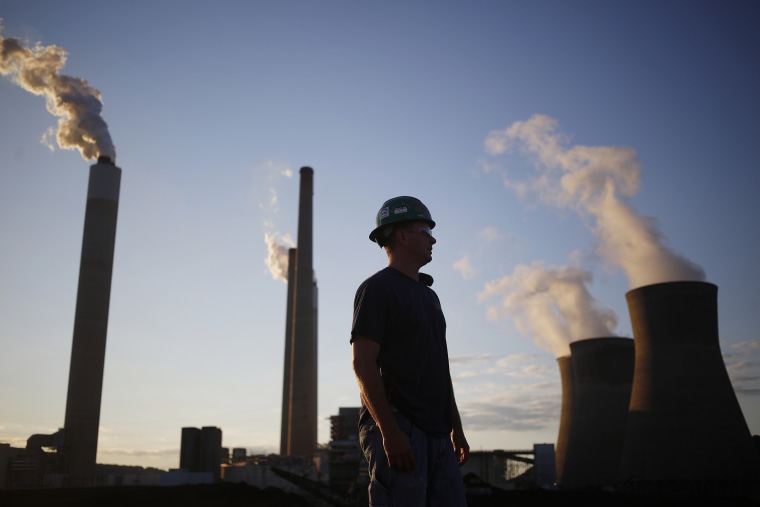
This story was published in partnership withCovering Climate Now, a global journalism collaboration strengthening coverage of the climate story. The author is Covering Climate Now's deputy director.
Growing up in southern West Virginia, Jacob Hannah was always of two minds about coal.
His father and grandfather were coal miners. Coal meant a roof over their heads and a tie to bind the small community of Wilsondale that they called home. People there found purpose in coal, proud to know their work was helping power the nation.
But Hannah, 29, also saw neighbors who grappled with nasty illnesses: bronchitis, black lung and cancer. Worksite injuries were a constant. And he began to hear more news about climate change and the role that coal and other fossil fuels played.
"The coal economy is a sinking ship," he said, "but it's difficult for anyone who grew up in Appalachia not to feel a sense of defensiveness and protectiveness towards coal."
Hannah is a conservation coordinator for Coalfield Development, a nonprofit group working to revitalize West Virginia, in part through clean energy. The organization recently put in place the state's largest nonprofit solar installation. He's proud of his family's legacy but traveling around the state and taking stock of shuttered storefronts and scarred land have convinced him that the need for change is clear.
"We need an antidote," he said. "We need medicine to strengthen our communities."

At a time when U.S. leaders are finally moving to address climate change, it's fitting that a state long at center stage in America's resource-extraction economy would hold the spotlight.
Since the start of Joe Biden's presidency, all eyes have been on Sen. Joe Manchin, D-W.Va., whose vote in an evenly divided Senate positions him as a linchpin in the federal climate agenda. Prior to entering politics, Manchin founded and ran the coal-brokerage firm Enersystems. He handed the company to his son upon being elected West Virginia's secretary of state in 2000 — he served later as governor, before joining the U.S. Senate in 2010 — but retained millions in company stocks. According to the senator's financial disclosures, Manchin continues to earn hundreds of thousands each year from the sale of coal.
To date, the centrist Democrat has been critical of the action that scientists around the world agree is necessary to avoid the worst of the climate emergency. He argues that a rapid move toward clean energy could sound the death knell for communities already suffering from fossil fuels' decline.

In Manchin's home state, however, some say change can't come soon enough. Coal remains a backbone of some West Virginia communities. But with a nationwide shift toward renewables underway, many West Virginians are eager to secure a place for the state in America's clean energy future.
"For a long time, the culture here has been, 'What's good for coal is good for West Virginia,'" said James Van Nostrand, director of the Center for Energy and Sustainable Development at the West Virginia University College of Law. "But that hasn't been true for 10 years, or decades longer."
Coal in decline
In the mid-1900s, coal employed more than 100,000 people in the Mountain State. Over the years, new technology enabled companies to mine more with fewer workers. Then, beginning in the mid-2000s, the shale revolution saw natural gas challenge and ultimately, in 2016, replace coal as America's leading energy source for electricity production. In 2019, the last year for which data is available from the U.S. Energy Information Administration, coal employment in West Virginia was down to roughly 14,000.
Throughout this decline, poverty spiked, placing West Virginia consistently among the poorest states in the country. The state has also come to lead the nation in population decline, with young West Virginians increasingly leaving to find gainful employment. A grim joke in the state goes that people have overtaken coal as West Virginia's top export.
In a state prized for its natural beauty, the environmental situation is no better. Abandoned mines and thousands of uncapped oil and gas wells pollute local air and water. Mountaintop removal, a mining practice that involves deforesting mountain peaks and then blasting them out of existence to get at coal underneath, continues to cover surrounding areas in hazardous dust.
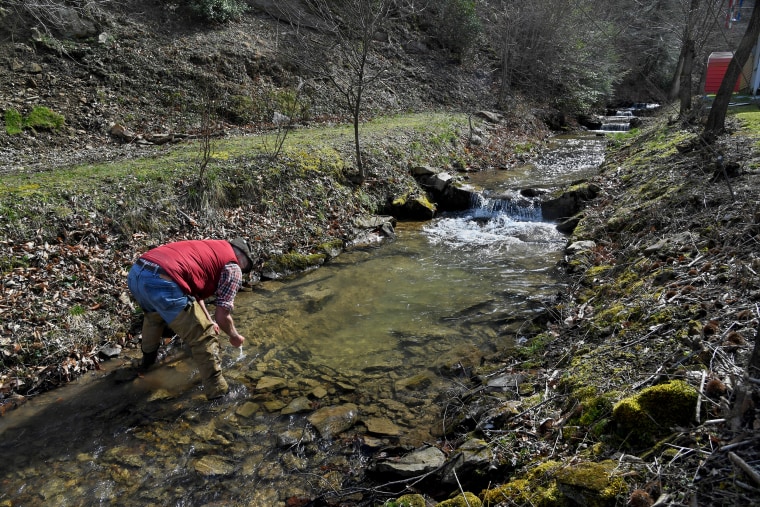
Health impacts are widespread, and in Charleston, the state capital, deregulation is standard. Many political leaders in West Virginia have direct ties to the coal industry, including Gov. Jim Justice, a Republican and a billionaire who owns multiple coal companies and, in his official capacity, oversees the state regulatory arms meant to hold those companies accountable.
"It's not uncommon for me to turn on the tap water, and it's brown," said Angie Rosser, director of the environmental nonprofit West Virginia Rivers Coalition. "That's normal in many parts of West Virginia. Some of us don't remember ever having safe water."
The floods
Further emphasizing West Virginia's legacy as a fossil fuel producer, climate change is also taking a toll.
Rosser, like many West Virginians, lives near a river. In June 2016, torrential rains filled the Elk River outside her home, triggering a flash flood. That day, floods killed 23 people and devastated much of central West Virginia. She said her town, Clendenin, hasn't been the same since.
"People have left," she said. "There are abandoned houses. We still don't have a grocery store."
Scientists called the flooding a "thousand-year event" but only a preview of what climate change might have in store for West Virginia. As global heating progresses, the Appalachian region is projected to become significantly wetter, with heavier rainfall making floods both more likely and more dangerous.
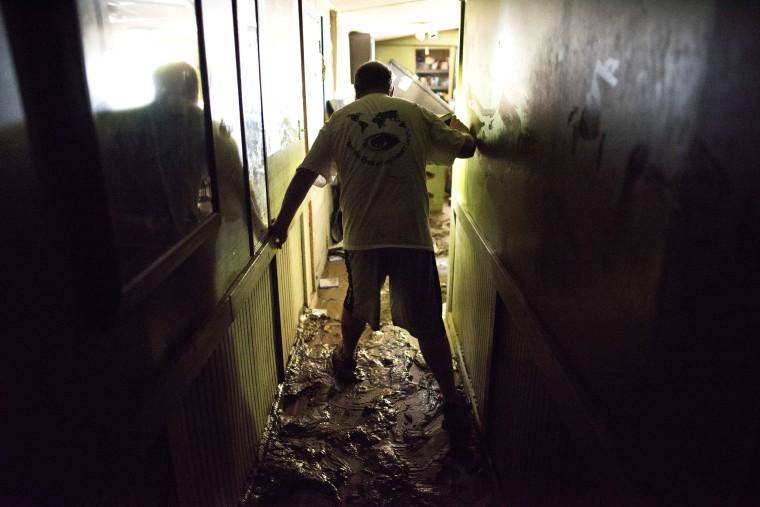
Traditionally, climate change has been a near-verboten subject in her state, Rosser said. The implicit threat to coal was always one thing. In a deeply conservative state, the politicization of climate change was another. A 2020 study by Yale University and George Mason University showed that fewer people in West Virginia believed climate change was occurring than in any other state — 59 percent of adults compared with 72 percent nationwide.
Affinities toward coal notwithstanding, she said it's clear that West Virginians' foremost loyalties lie with their families and preserving the state as a safe and prosperous place to call home.
"I'm hearing more conversations acknowledging that coal isn't coming back," Rosser said. "There's a lot of fear and anxiety actually that maybe we waited too long."
'Just transition'
Increasingly, a transition away from coal might be a conversation some West Virginians are willing to entertain.
Along with other local nonprofit group, Rosser's organization recently produced a "Citizens Guide to Climate Change." Written "by West Virginians, for West Virginians," she said, the guide aims to push climate discourse in the state forward, unpacking the causes and impacts of climate change from a local perspective and laying out a menu of potential solutions, such as a Green New Deal, enhanced emissions regulations and a carbon tax.
Rosser expected skepticism, but responses to the guide have been positive, she said. Especially resonant is the goal of a "just transition," which suggests that, although fossil fuels are very much to blame for climate change, a special debt is owed to fossil fuel workers, as the nation shifts to new sources of energy.
"We put in the work to lift America into an industrialized power, through the use of coal," Rosser explained. "Now, we deserve reinvestment."
And West Virginia is ripe for reinvestment, according to Jeremy Richardson, a native West Virginian and a senior analyst with the Union of Concerned Scientists' Climate and Energy program. There is "plenty of untapped potential," he said, to create jobs as an "off-ramp" for current and former coal workers — first, in reclaiming and restoring land damaged by fossil fuel exploitation and, second, in domestic manufacturing of clean energy components, such as windmill blades and parts for solar panels. West Virginia is also well-suited to wind and solar energy production.
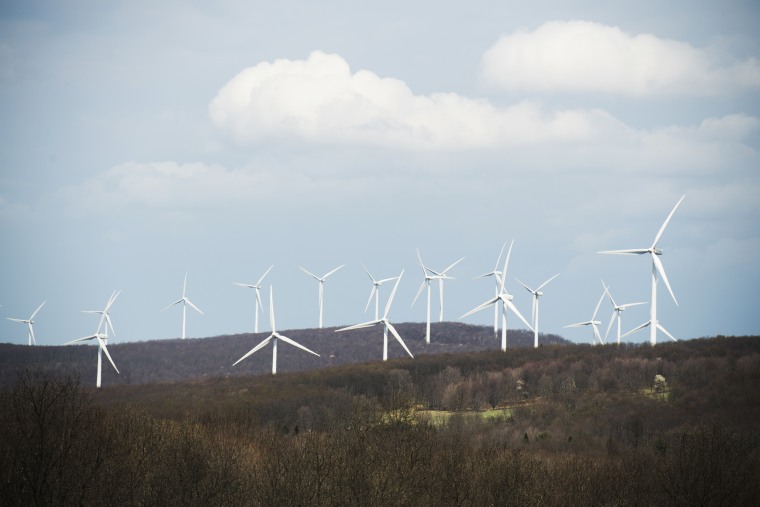
Clean energy is unlikely to replace every coal and fossil fuel job lost in West Virginia, he added. But it can help begin to diversify the state's economy. It will also make West Virginia more attractive to outside industries and companies, such as car manufacturers — which increasingly have made their own climate commitments and, thus, are unlikely to invest where clean energy is scarce — sparking further economic development.
"West Virginia is behind the eight ball, because we haven't done a lot by way of developing and deploying clean energy," Richardson said. "We really need to go far fast."
Whether West Virginians will reap the benefits of clean energy opportunities depends in large part on the state's leaders in both Charleston and Washington, said Van Nostrand, of West Virginia University. In this regard, there have been halting gestures toward sustainability, he added, but the state lags behind most others, as well as the latest climate science. In August, a landmark United Nations report warned that the consequences of climate change, including the extreme weather wreaking havoc already, will grow dramatically worse this century if humanity fails to rein in emissions.
Also critical: making sure climate action reaches communities of color in West Virginia. The state is more than 90 percent white, but African Americans nevertheless comprised a substantial portion of the coal labor force, said Pam Nixon, a community organizer with the Charleston, West Virginia, chapter of the NAACP.
As technology in the industry progressed, though, Black workers typically weren't selected for training opportunities; when layoffs became commonplace, they were far more likely than their white peers to be let go.
"When Manchin and others talk about not leaving coal workers behind, they don't usually acknowledge that Black coal workers were left behind years ago," she said. "We need to make sure this trend doesn't continue. Blacks and Latinos in West Virginia, we need to be sitting at the table."
A decision
Manchin, who chairs the Senate Energy and Natural Resources Committee, was instrumental to the $1.2 trillion bipartisan infrastructure package, passed in August by the Senate and pending House approval. That bill includes some $120 billion for clean energy and climate resilience projects, as well as $21 billion to clean up abandoned mines and cap leaking oil and gas wells.
Experts say these provisions can be a boon for West Virginia, but they'll fall short of meeting the needs of the state. At the national level, climate scientist Michael E. Mann called the bill "a far cry from meeting the moment," arguing that it does nothing to reduce America's reliance on fossil fuels.
A separate, larger bill, hailed as the most comprehensive climate legislation in U.S. history, promises more robust investments in renewables. But Manchin has said he opposes the measure, citing its $3.5 trillion price tag.
Manchin's Senate office did not respond to an emailed request for comment.
Unwilling to wait, some in the senator's state are taking matters into their own hands.
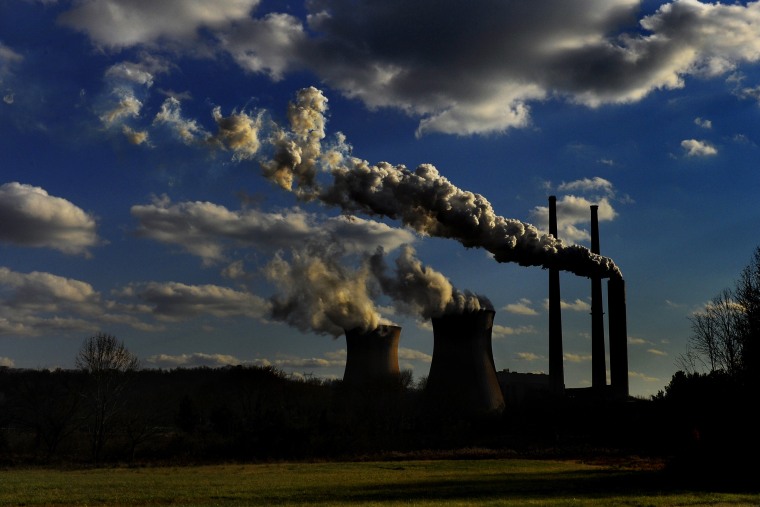
This summer, West Virginia environmental groups banded together, traveling to six communities in the state as part of the "Democracy, Jobs, and Care-a-van Summer Jam." They offered live music, free food, prayer and a message about clean energy.
"The best way to honor West Virginians as energy producers is to bring them into what clean energy looks like today," said Morgan Sell, an organizer with the West Virginia Working Families Party and president of the Eastern Panhandle Green Coalition.
Sell said she found people receptive, even those with politics different from her own. But many were also angry at the pain and poverty their communities had been asked to endure.
"When you talk about clean energy or something like manufacturing electric vehicles, West Virginians are extremely interested," she said. "But politicians aren't having these conversations with us. Instead, they make assumptions about what we want."
Indeed, a June poll by Data for Progress and the Chesapeake Climate Action Fund found that a clear majority of West Virginians, 56 percent, support a clean electricity transition by 2035, while only 36 percent oppose such a transition.
"We're intensely creative people in West Virginia," Sell said. "We have the drive to bring ourselves out of this, to build ourselves up. We just need resources and support."
Source: https://www.nbcnews.com/science/environment/west-virginia-coal-industry-grapples-impact-climate-crisis-rcna2397
0 Response to "Do You Think Coal Will Continue to Be a Primary Energy Source in Wv Essay"
ارسال یک نظر